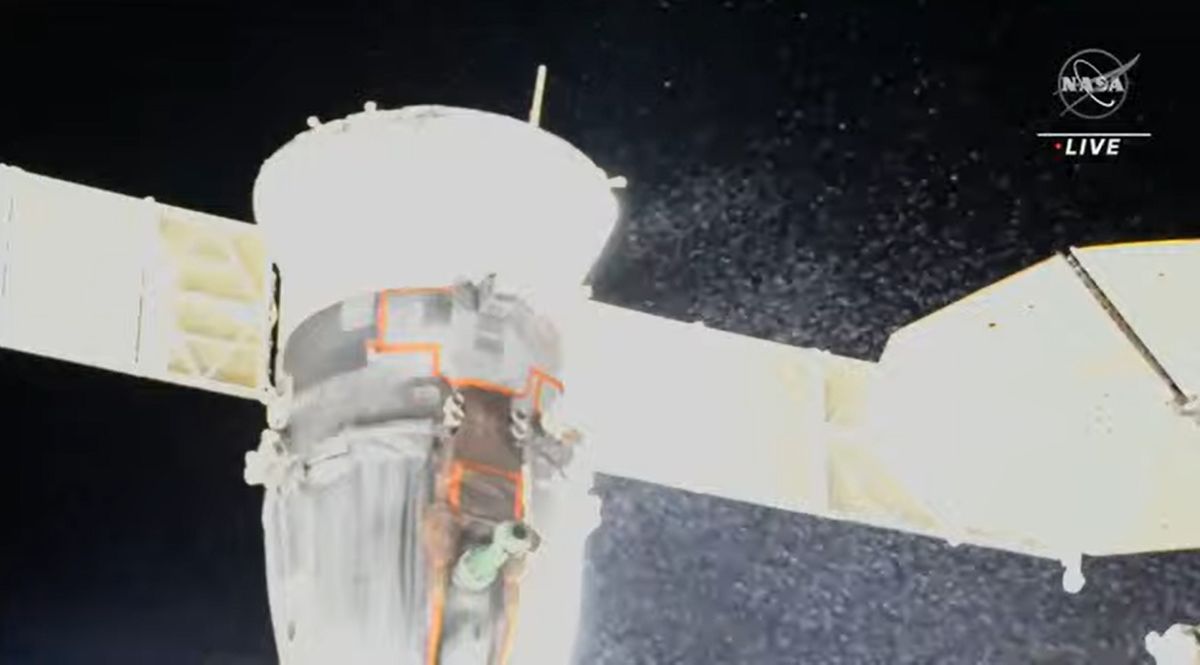
An uncontrolled coolant leak on a Russian-built Soyuz spacecraft docked at the International Space Station had damaged the crew capsule, Russia's space agency Roscosmos has said in a statement.
On Wednesday (Dec. 14) at 7:45 p.m. EST (0045 GMT on Dec. 15), a violent coolant leak on Russia's Soyuz MS-22 spacecraft currently docked to the International Space Station (ISS) was detected while Expedition 68 cosmonauts Sergey Prokopyev and Dmitry Petelin were preparing for a nearly seven-hour spacewalk outside the ISS. The extravehicular activity (EVA) was called off after both cosmonauts were already in their spacesuits and beginning to depressurize the airlock. Cameras on the outside of the space station showed a steady stream of frozen coolant shooting into space from the Soyuz capsule as the cosmonauts returned to the main body of the station.
On Thursday (Dec. 15), Roscosmos issued a statement (opens in new tab) via its Telegram channel, writing that "according to preliminary information, on Thursday, December 15, the outer skin of the instrument and assembly compartment of the Soyuz MS-22 manned spacecraft was damaged," but that the crew aboard the space station remains safe, according to a translation by Google (opens in new tab). (The incident occurred at 3:45 a.m. local time on Dec. 15 for Russia's mission control.)
Related: Soyuz spacecraft suffers 'fairly substantial' leak at space station
"The crew reported that the warning device of the ship's diagnostic system went off, indicating a pressure drop in the cooling system. A visual inspection confirmed the leak, after which it was decided to interrupt the planned extravehicular activities by the crew members of the Russian segment of the ISS, Sergey Prokopiev and Dmitry Petelin," Roscosmos officials wrote in the statement.
"At the moment, all systems of the ISS and the ship are operating normally, the crew is safe," the statement continued. "After analyzing the situation, a decision will be made on the further actions of both specialists on Earth and members of the crew of the ISS Russian segment."
RELATED STORIES:
NASA issued a similar statement (opens in new tab) on Thursday, writing that "NASA and Roscosmos will continue to work together to determine the next course of action following the ongoing analysis. The crew members aboard the space station are safe, and were not in any danger during the leak."
In response to a request for more detailed information from Space.com, a NASA spokesperson said the agency will issue an update on its blog (opens in new tab).
It remains unclear how the leak and damage to the Soyuz craft will affect the planned March 2023 return of the MS-22 crew, which includes NASA astronaut Frank Rubio. Neither NASA nor Roscosmos has given any hint of whether the MS-22 capsule meant to carry Rubio, Petelin and Prokopiev home remains flightworthy following the apparently significant loss of coolant.
It is also unknown whether the ISS as a whole or the Cygnus cargo spacecraft docked near MS-22 suffered any damage due to the leak. There are also two Progress cargo capsules, a Dragon cargo capsule and a Crew Dragon, which carried NASA's Nicole Mann and Josh Cassada, Japan's Koichi Wakata and cosmonaut Anna Kikina to the space station in October 2022.
The space agencies haven't suggested which particular coolant leaked from the Soyuz vehicle, but ammonia, a common spacecraft coolant, can be corrosive to many metals.
Follow Brett on Twitter at @bretttingley (opens in new tab). Follow us on Twitter @Spacedotcom (opens in new tab) or on Facebook (opens in new tab).
Article From & Read More ( Soyuz capsule damaged by uncontrolled leak while at space station, Russia's space agency says - Space.com )https://ift.tt/Z1ljvI4
Science
No comments:
Post a Comment